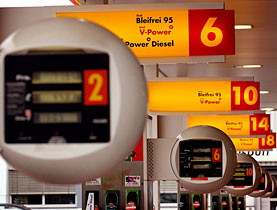Climate ranking causes red Swiss faces

Switzerland has come ninth in an international ranking on climate protection issues, thanks mainly to the large amount of hydroelectric power used.
But judged solely on its climate policy, Switzerland dropped to 45th on environmental group Germanwatch’s 40th annual index. Sweden and Germany came top.
“Switzerland is doing too little to improve the climate,” said Patrick Hofstetter from environmental group WWF Switzerland in reaction to the news.
“We have so far failed to reduce Switzerland’s carbon dioxide emissions below 1990 levels. According to the CO2 law, which was agreed long ago, these must be reduced by ten per cent by 2010.”
Germanwatch’s Climate Change Performance Index, released on Friday at the United Nations’ environment conference in Bali, compares the climate protection performances of 56 industrialised countries and emerging economies that together account for more than 90 per cent of global CO2 emissions.
The calculations also take into account pollution levels and trends, as well as overall climate policy.
Hofstetter said that for Switzerland to fulfil its Kyoto obligations, the government was going to have to do more “and come up with some useful plans of action regarding energy efficiency and renewable energy”.
WWF Switzerland also repeated its calls for a “long overdue” carbon tax.
Kyoto
Delegates from nearly 190 nations are attending the gathering in Bali, which runs until December 14. They are charged with launching negotiations that will eventually lead to an international accord to succeed the Kyoto pact, which expires in 2012.
The Swiss delegation in Bali considers that progress has been made and that the conference will build on the spirit of the Kyoto accord.
Delegation head Thomas Kolly said at the end of the first week that he was satisfied with the “constructive atmosphere” at the meeting. “I am optimistic and confident about future decisions,” he added.
Environment Minister Moritz Leuenberger will head to Bali next week to defend Switzerland’s position, close to the European Union’s own, which calls for a 20 per cent reduction of greenhouse gases compared with 1990 by 2020.
The 175-nation Kyoto agreement requires 36 industrial nations to reduce greenhouse gas emissions, a key source of global warming, by an average of five per cent below 1990 levels by 2012.
Without action, scientists warn of catastrophic droughts and floods, collapsing ice sheets and vanishing coastlines.
On Germanwatch’s climate index, Saudi Arabia, the world’s largest oil exporter, was the biggest “climate sinner” for the second year in a row because it has no policies to address its growing emissions.
The United States, the only major industrialised country not to have signed Kyoto, followed directly behind.
Washington opposes mandatory cuts in emissions and argues that technology, private investment and economic growth will save the planet from global warming. It has struggled to defend its position at the Bali meeting.
Sweden was doing the best job, but even it could improve, the environmentalists said. It was followed by Germany, Iceland and Mexico.
swissinfo with agencies
The biggest emitters of CO2:
United States: 21.4% of global emissions
China: 18.8%
Russia: 5.7%
India: 4.2%
Germany: 3%
The Climate Change Performance Index (CCPI), published annually by environmental NGO Germanwatch, compares the climate protection performances of 56 countries which account for more than 90 per cent of global CO2 emissions.
The index is published for the third time this year in Bali. A survey among national climate experts complements the quantitative part of the index and provides a detailed evaluation of the individual countries’ national and international climate policies.
Compared with last year’s results, Denmark, Japan, and Ireland experienced the largest decline in their ranks, while Mexico, Spain, and China have moved up most significantly.

In compliance with the JTI standards
More: SWI swissinfo.ch certified by the Journalism Trust Initiative


You can find an overview of ongoing debates with our journalists here. Please join us!
If you want to start a conversation about a topic raised in this article or want to report factual errors, email us at english@swissinfo.ch.